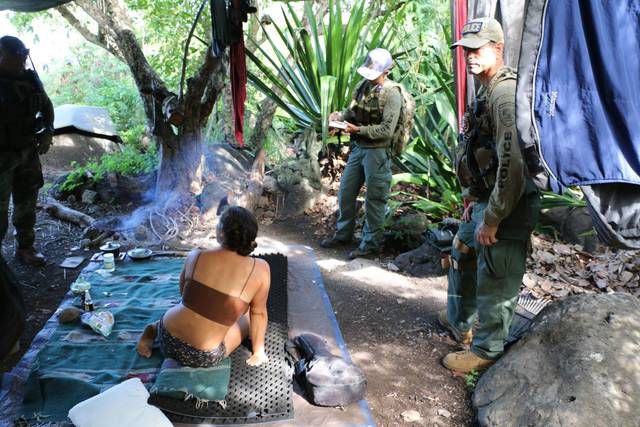KALALAU — A recent flurry of activity on social media about illegal goings on in the Kalalau Valley has stirred anti-squatter sentiment on Kauai, and some are calling for a change in the area’s management.
“Looking for a group of positive-minded Kanaka who are willing to enter Kalalau with me to help cleanse our ‘aina of these trespassers taking refuge in lands of our own ‘iwi kupuna,” wrote one Kauai resident in a newly-formed Facebook group, “Kalalau Outlaws.”
Another Kauai resident wrote: “I hope all of the hippies squatting in Kalalau or planning on squatting have figured out that it’s time to find a new place to desecrate … you’re not welcome here. Aloha is not a sign of weakness, the party is over.”
The desire to uproot squatters from the Kalalau Valley isn’t new, but it was reignited after an April 27 vehicle crash in Kapaa that resulted in the death of 19-year-old Kapaa resident Kayla Huddy-Lemn.
The driver was Cody Safadago, 46, originally from Washington State, who was living in the Kalalau Valley before the wreck. According to court testimony, Safadago was driving a stolen car at least 88 mph in a 35 mph zone and had a blood-alcohol content of .248 (three times the legal limit) on that night.
The crash threw a spotlight on others squatting in the Kalalau Valley, many who are allegedly outlaws.
“They need to have full-time enforcement in there to manage the people that come into that valley,” said Tanya Bordenkircher, who lives in Kapahi. “That’s the biggest problem right now.”
Last week, the state’s Department of Land and Natural Resources’ Division of Conservation and Resources Enforcement raided the valley and arrested 17 people, three of which were living in the valley “for long periods of time” according to a news release. All of those people were arrested because they didn’t have permits for camping.
The sweeps were in response to the uptick in social media activity, where footage from the past several years of illegal and culturally disrespectful activities has been circulated.
“We continue to hear about a lot of illegal activity at Kalalau through social media channels,” said DOCARE enforcement Chief Robert Farrell in the release.
He continued: “Some of the behavior depicted … is brazen, clearly illegal, disrespectful to the Hawaiian culture, damaging to natural resources, and completely devoid of any appreciation for the wilderness character of the Napali Coast.”
The footage that is circulating shows a man known as Krazy Red and a few other people partying on sacred sites in the valley, as well as on Maui, and locals want that to stop.
“You will see (in the footage) this man known as Krazy Red standing on top of a sacred pohaku in a sacred area that we as Kanaka must protect,” a Kauai local wrote on Facebook.
It’s more than a combination of the heiau desecration and the trash accumulation that’s offensive to residents. The self-appointed “Guardians of Kalalau,” who maintain a food forest type garden in the valley, have no business being there, some locals say.
“Living off the land can be amazing and beautiful when being done on land you own,” wrote one Kauai local on social media.
The issue was explained as a “battle” between indigenous people and westernized thinking in one online blog post.
“Oh behalf of those who we share our magnificent culture with, no longer (are we) just going to stand by and continue to (just) allow anyone (into the Kalalau),” the author wrote. “It’s time to get the hell out of Kalalau.”
Locals who want to camp at the Kalalau Valley have to secure a permit like everyone else, and sometimes trips have to be scheduled six months in advance to get a permit because the destination is so popular.
“Kalalau has been unreachable by the right people and occupied by the wrong for too long,” said Fern Rosenstiel of Wailua.“Locals don’t plan six months ahead in the valley, they know the Friday before.”
But she doesn’t suggest more rigorous DLNR enforcement; she’s one of the people encouraging community involvement in the issue.
“Hawaiians are feeling the pull to step up and take ownership and do something,” she said. “We feel abused because these people are allowed to come here and live like this with no regulation while we can barely pay our land taxes.”
It’s the freeloaders who are offensive to the local people, Rosenstiel pointed out, not those who visit the Kalalau Valley with permits, stay a few days and go back home.
Instead of more state enforcement, she suggests a native Hawaiian presence in the cabin that’s out in the Kalalau Valley to maintain the land keep an eye on visitors.
“I don’t want to see over-policing,” she said. “We need local people in there to keep people in line and the right people safe.”
DOCARE and State Parks are continuing to collaborate on future law enforcement and cleanup operations as resources permit, according to a news release, and officers continue to take a hard line against those who can’t produce permits.
“No permit and you will be arrested and then have to appear in court,” Chief Farrell said.




